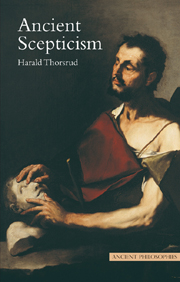Book contents
- Frontmatter
- Contents
- Preface
- Sources and abbreviations
- Chronology
- 1 Introduction
- 2 Pyrrho and Timon: the origin of Pyrrhonian Scepticism
- 3 Arcesilaus: the origin of Academic Scepticism
- 4 Carneades
- 5 Cicero: the end of the sceptical Academy
- 6 Aenesidemus: the Pyrrhonian revival
- 7 Sextus Empiricus: the consistency of Pyrrhonian Scepticism
- 8 Pyrrhonian arguments
- 9 The (ordinary) life of a Pyrrhonist
- Notes
- Guide to further reading
- References
- Index of passages
- Index
5 - Cicero: the end of the sceptical Academy
- Frontmatter
- Contents
- Preface
- Sources and abbreviations
- Chronology
- 1 Introduction
- 2 Pyrrho and Timon: the origin of Pyrrhonian Scepticism
- 3 Arcesilaus: the origin of Academic Scepticism
- 4 Carneades
- 5 Cicero: the end of the sceptical Academy
- 6 Aenesidemus: the Pyrrhonian revival
- 7 Sextus Empiricus: the consistency of Pyrrhonian Scepticism
- 8 Pyrrhonian arguments
- 9 The (ordinary) life of a Pyrrhonist
- Notes
- Guide to further reading
- References
- Index of passages
- Index
Summary
There are two narratives we can tell regarding the end of the sceptical Academy. According to the first, the fallibilist interpretation of Carneades is historically wrong, and philosophically ill advised. It was a mistake to positively endorse the claims that earlier Academics advanced dialectically. Compared to the originally radical and pure scepticism of Arcesilaus, the later product is an exhausted and degenerate compromise. Arcesilaus was right to insist on the universal suspension of judgement; to compromise on this point is to abandon what is best about Academic Scepticism. This is the line pursued by the renegade Academic Aenesidemus, whom we shall meet in Chapter 6.
According to the second narrative, one version of which we shall develop in this chapter, Arcesilaus' successors were right to modify and mitigate his originally radical scepticism. In particular they were right to limit the scope of what we must suspend judgement about, and to enlarge the scope of sceptically appropriate assent. Viewed in this way, their concessions constitute progress: the culmination of many years of philosophical debate with the Stoics.
At the heart of this dispute is the issue of whether it is ever wise to accept a proposition that is not known to be true. In other words, what will the sage do in the absence of certainty? Arcesilaus and Carneades agree that he will suspend judgement. But by modify-ing what it means to suspend judgement, Carneades also allows for practical deliberation leading to fallible beliefs in accordance with convincing impressions.
- Type
- Chapter
- Information
- Ancient Scepticism , pp. 84 - 101Publisher: Acumen PublishingPrint publication year: 2008

